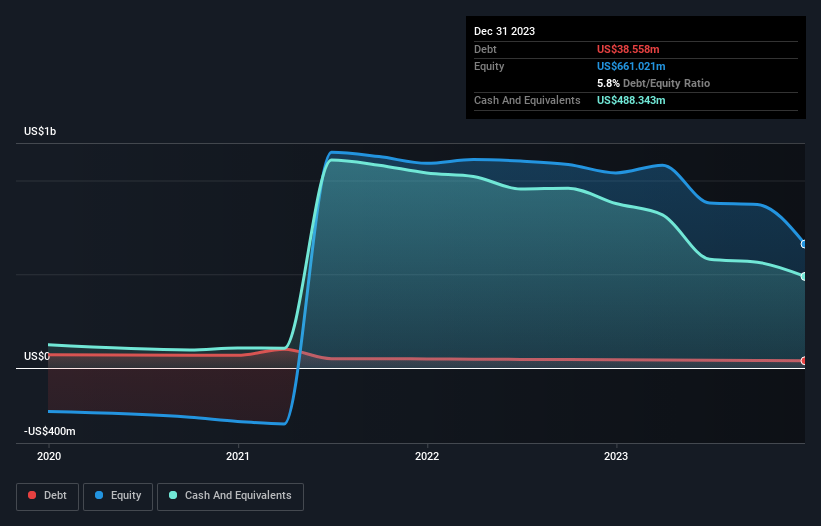The external fund manager backed by Berkshire Hathaway's Charlie Munger, Li Lu, makes no bones about it when he says 'The biggest investment risk is not the volatility of prices, but whether you will suffer a permanent loss of capital.' So it seems the smart money knows that debt - which is usually involved in bankruptcies - is a very important factor, when you assess how risky a company is. As with many other companies agilon health, inc. (NYSE:AGL) makes use of debt. But the more important question is: how much risk is that debt creating?
What Risk Does Debt Bring?
Generally speaking, debt only becomes a real problem when a company can't easily pay it off, either by raising capital or with its own cash flow. In the worst case scenario, a company can go bankrupt if it cannot pay its creditors. However, a more frequent (but still costly) occurrence is where a company must issue shares at bargain-basement prices, permanently diluting shareholders, just to shore up its balance sheet. Having said that, the most common situation is where a company manages its debt reasonably well - and to its own advantage. When we examine debt levels, we first consider both cash and debt levels, together.
Check out our latest analysis for agilon health
What Is agilon health's Net Debt?
You can click the graphic below for the historical numbers, but it shows that agilon health had US$38.6m of debt in December 2023, down from US$43.5m, one year before. But it also has US$488.3m in cash to offset that, meaning it has US$449.8m net cash.

A Look At agilon health's Liabilities
We can see from the most recent balance sheet that agilon health had liabilities of US$977.2m falling due within a year, and liabilities of US$102.7m due beyond that. Offsetting these obligations, it had cash of US$488.3m as well as receivables valued at US$942.5m due within 12 months. So it actually has US$351.0m more liquid assets than total liabilities.
This excess liquidity suggests that agilon health is taking a careful approach to debt. Given it has easily adequate short term liquidity, we don't think it will have any issues with its lenders. Simply put, the fact that agilon health has more cash than debt is arguably a good indication that it can manage its debt safely. When analysing debt levels, the balance sheet is the obvious place to start. But it is future earnings, more than anything, that will determine agilon health's ability to maintain a healthy balance sheet going forward. So if you want to see what the professionals think, you might find this free report on analyst profit forecasts to be interesting.
In the last year agilon health wasn't profitable at an EBIT level, but managed to grow its revenue by 81%, to US$4.3b. Shareholders probably have their fingers crossed that it can grow its way to profits.
So How Risky Is agilon health?
By their very nature companies that are losing money are more risky than those with a long history of profitability. And in the last year agilon health had an earnings before interest and tax (EBIT) loss, truth be told. And over the same period it saw negative free cash outflow of US$187m and booked a US$195m accounting loss. While this does make the company a bit risky, it's important to remember it has net cash of US$449.8m. That means it could keep spending at its current rate for more than two years. agilon health's revenue growth shone bright over the last year, so it may well be in a position to turn a profit in due course. By investing before those profits, shareholders take on more risk in the hope of bigger rewards. The balance sheet is clearly the area to focus on when you are analysing debt. However, not all investment risk resides within the balance sheet - far from it. Be aware that agilon health is showing 2 warning signs in our investment analysis , you should know about...
Of course, if you're the type of investor who prefers buying stocks without the burden of debt, then don't hesitate to discover our exclusive list of net cash growth stocks, today.
New: AI Stock Screener & Alerts
Our new AI Stock Screener scans the market every day to uncover opportunities.
• Dividend Powerhouses (3%+ Yield)
• Undervalued Small Caps with Insider Buying
• High growth Tech and AI Companies
Or build your own from over 50 metrics.
Have feedback on this article? Concerned about the content? Get in touch with us directly. Alternatively, email editorial-team (at) simplywallst.com.
This article by Simply Wall St is general in nature. We provide commentary based on historical data and analyst forecasts only using an unbiased methodology and our articles are not intended to be financial advice. It does not constitute a recommendation to buy or sell any stock, and does not take account of your objectives, or your financial situation. We aim to bring you long-term focused analysis driven by fundamental data. Note that our analysis may not factor in the latest price-sensitive company announcements or qualitative material. Simply Wall St has no position in any stocks mentioned.
About NYSE:AGL
agilon health
Provides healthcare services for seniors through primary care physicians in the communities of the United States.
Undervalued with excellent balance sheet.
Similar Companies
Market Insights
Community Narratives





